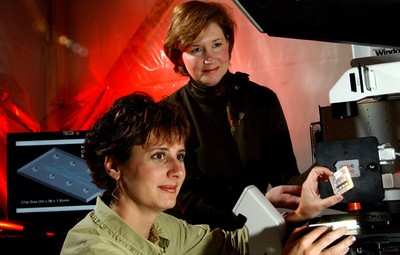Goal: Help Protect Future Space Explorers And Detect Life Forms
On Mars
With a microscope and computer monitor, researchers at NASA's
Marshall Space Flight Center in Huntsville (AL) watch fluorescent
bacteria flow through tiny, fluid highways on a dime-sized lab on a
chip.
Lab-on-a-chip technology allows chemical and biological
processes -- previously conducted on large pieces of laboratory
equipment -- to be performed on a small glass plate with fluid
channels, known to scientists as microfluidic capillaries.
"We are studying how lab-on-a-chip technology can be used for
new tools to detect bacteria and life forms on Earth and other
planets and for protecting astronauts by monitoring crew health and
detecting microbes and contaminants in spacecraft," explains Dr.
Helen Cole, project manager for the Lab-on-a-Chip Applications
Development program.
The chips are made with the same micro-fabrication technique
used to print circuits on computer chips. Chemicals and fluid
samples can be mixed, diluted, separated, and controlled using
channels or electrical circuits embedded in the chip. On Earth,
some basic lab-on-a-chip technology approaches are being used for
commercial, medical diagnostic applications, such as an in-office
test for strep throat, or modern in-home pregnancy tests. These
applications conduct a test and yield results in a short time, with
a hand-held portable device containing a simple chip design.
"NASA requires complex lab-on-a-chip technology, so scientists
can conduct multiple chemical and biological assays or perform many
processes on a single chip," says Cole. "Current commercial devices
are not designed to work in space, so we are developing a set of
unique chips along with a corresponding miniaturized controller and
analysis unit.
NASA researchers are developing complex, portable microarray
diagnostic chips to test for all the genes and DNA responsible for
determining the traits of a particular organism, detect specific
types of organisms, or use biosensor-like probes such as antibodies
to detect molecules of interest. By applying this technology in
laboratories and in the field where organisms live in extreme
environments on Earth, astrobiologists can compare Earth-life with
that which may be found on other planets.
"The micro array chip system developed to go to Mars will be
lightweight, portable and capable of detecting organic molecules,"
says Dr. Lisa Monaco, the project scientist for the Lab-on-a-Chip
Applications Development program. "This instrumentation can easily
be adapted for monitoring crew health and their environment."
Since the chips are small, a large number of them can be carried
on a Mars rover to search for life or on carried on long-duration
human exploration missions for monitoring microbes inside lunar or
Martian habitats.
"We need customized microarray chips to find and characterize
life at remote places on Earth, Mars, and other places in the solar
system," says Dr. Andrew Steele, a scientist at the Carnegie
Institution of Washington, a private research organization. Steele,
the principal investigator for the Modular Assays for Solar System
Exploration (MASSE) project, is working with Marshall scientists
and engineers to develop the technology and instruments needed to
analyze samples quickly and produce images of samples.

"When astrobiologists study life in extreme environments -
whether it lives deep in the ocean, in Antarctica, or on Mars -
they need a handheld device or something that can fit on a small
robot," Steele explains. "We also need to be able to analyze the
tests as quickly as possible within periods from 1 to 24 hours.
Marshall is one of just a few places in the world developing these
specific technologies for space and exploration applications and
has unique experience in miniaturizing these instruments and
designing them for the harsh space environment."
The Marshall Center team is collaborating with scientists at
other NASA centers and at universities to design chips for many
applications, such as studying how fluidic systems work in
spacecraft and identifying microbes in self-contained life support
systems. To make customized chips for these various applications,
NASA has an agreement with the U.S. Army's Microdevices and
Microfabrication Laboratory at Redstone Arsenal in Huntsville. The
lab-on-a-chip research is funded by NASA's Biological and Physical
Research Enterprise through the Marshall Center's Microgravity
Science and Applications Division.
 SpaceX to Launch Inversion RAY Reentry Vehicle in Fall
SpaceX to Launch Inversion RAY Reentry Vehicle in Fall Aero-News: Quote of the Day (04.23.24)
Aero-News: Quote of the Day (04.23.24) Aero-News: Quote of the Day (04.20.24)
Aero-News: Quote of the Day (04.20.24) ANN's Daily Aero-Linx (04.20.24)
ANN's Daily Aero-Linx (04.20.24) Aero-News: Quote of the Day (04.21.24)
Aero-News: Quote of the Day (04.21.24)



